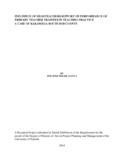| dc.description.abstract | Education is a vital tool in the development process of any given nation “A country which is unable to develop skills and knowledge of its people and to utilize them effectively in the national economy will be unable to develop. Education is considered the route to economic prosperity, the key to scientific and technological advancement; the foundation of social equality, equal wealth distribution, and the spearhead of political socialization and cultural diversity. But a yearly monitoring report by UNESCO’s Education for ALL (EFA) says governments are losing about $129 billion dollars per year on poor quality education. As a result, about one in four students in poor countries, about 175million young people are not able to read a complete
sentence. UNESCO says, several factors, including poor teacher training account for
underperforming educational systems. Teacher training process includes teaching practice as an intrinsic part. There is evidence to suggest that school-based teaching practice is considered to be the most important part of teacher training by student teachers. Teaching practice which is a key
component of the teacher training programme will ordinarily be conducted in a school setting under the jurisdiction of the headteacher. This means that the success or failure of this important component of teacher training depends on the management skills and prowess of the headteacher. Throughout the world there is increasing demand for teachers as at all levels of the education system. This is crucial for ensuring quality of education offered to children. The standards of education have been on a declining trend as reflected in National examinations such as K.C.P.E. This has been attributed to various factors such as overcrowded classes, teacher performance and inadequate teaching and learning resources. This study therefore is out to investigate the influence of headteachers on the performance of teacher trainees as it impacts on
how they undertake training, socialization into the profession. The study will therefore
endeavor to investigate the influence of headteachers on the performance of teacher trainees on teaching practice in Kakamega South Sub-County.
Teacher training in Kenya is weak and this implies that the success of any teacher training process is not executed effectively. The objectives of these study were to determine the influence of headteachers instructional practices on presentation of school curriculum by primary trainee teachers, to examine the influence of headteachers instruction resource provision in the implementation of the curriculum by primary teacher trainees, to identify the influence of the
headteachers mentoring practices on the performance of primary teacher trainees during teaching
practice, to assess the challenges headteachers face in providing support to primary teacher trainees in teaching practice.
The study adopted the descriptive research design and involved 20 headteachers, 20 deputies, 222 students’ trainees. Most of the participants selected using Simple Random Sampling although most schools involved in the study were selected purposefully. Questionnaires and interview schedules were used to collect primary data while documents were used to collect secondary data. Data collected was analyzed using descriptive statistics and was presented in
tabulated form mainly. | en_US |

